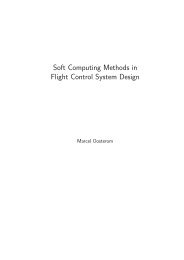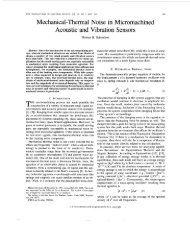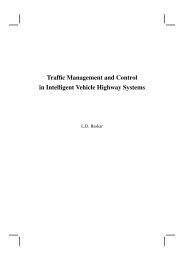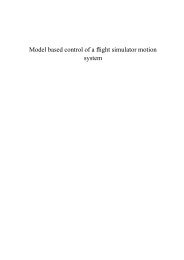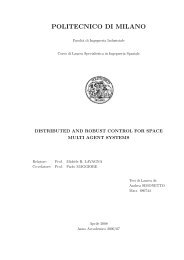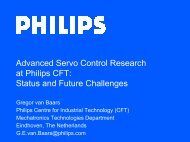Download GRID Feedback 2002 No.2 - Delft Center for Systems and ...
Download GRID Feedback 2002 No.2 - Delft Center for Systems and ...
Download GRID Feedback 2002 No.2 - Delft Center for Systems and ...
Create successful ePaper yourself
Turn your PDF publications into a flip-book with our unique Google optimized e-Paper software.
attention has shifted toward data-driven fuzzy <strong>and</strong> neuro-fuzzy modeling <strong>and</strong><br />
nonlinear model-based control.<br />
Figure 4: Genetic algorithms are based on a simplified simulation of the<br />
natural evolution cycle.<br />
The importance of effective model building tools <strong>for</strong> control can hardly be<br />
underestimated. Virtually all advanced control techniques require a reasonably<br />
accurate dynamic model of the plant. It is well known that the development of a<br />
nonlinear control-oriented model consumes a considerable part of the total project<br />
time <strong>and</strong> ef<strong>for</strong>t. By using fuzzy identification techniques, transparent <strong>and</strong> interpretable<br />
nonlinear models can be obtained through effectively combining partial physical<br />
knowledge with process data (gray-box modeling). Learning methods <strong>for</strong> fuzzy<br />
models have been developed that preserve semantic interpretability <strong>and</strong><br />
transparency under numerical optimization of parameters in these systems.<br />
Our current research in the area of nonlinear model-based control proceeds along<br />
four basic lines: 1. robust gain-scheduling (automated identification of operating<br />
points <strong>and</strong> scheduling functions, robust local <strong>and</strong> global design), 2. predictive control<br />
(development of effective optimization techniques, robustness issues), 3. faulttolerant<br />
control (consolidation of signals from redundant sensors, analytical<br />
redundancy, soft sensors), 4. self-tuning <strong>and</strong> adaptive control systems <strong>for</strong> partly<br />
unknown <strong>and</strong> time-varying systems (supervision of adaptation, identification of<br />
nonlinear actuator characteristics).<br />
The main current application domains are bioprocess industry (modeling <strong>and</strong><br />
adaptive control) <strong>and</strong> fly-by-wire aircraft control systems (gain-scheduling <strong>and</strong> faulttolerant<br />
control). The previous issue of <strong>Feedback</strong> included articles describing some<br />
of these activities in on going projects. Application examples from some of the past<br />
projects are: decision-support systems <strong>for</strong> various industrial processes (Henkel,<br />
Vermeer), nonlinear predictive controllers <strong>for</strong> indoor climate control (TNO Bouw),<br />
10



